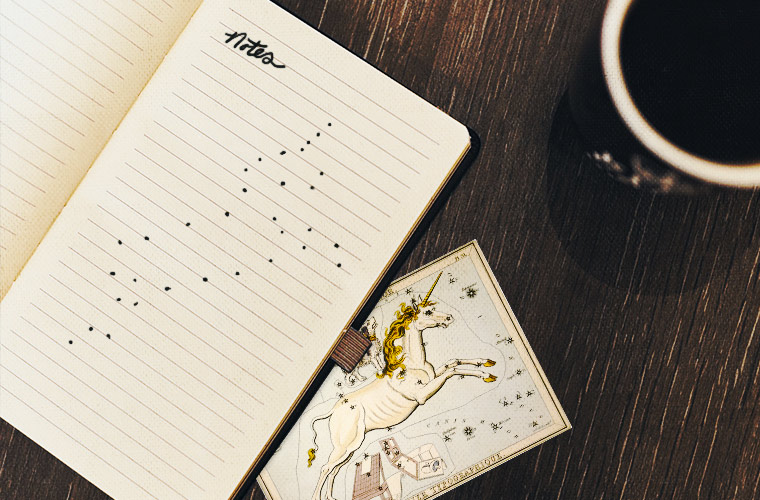
I love it when that happens. (I also love a good unicorn.) It makes me feel like all the bouts of meaningful living mixed with meandering conversations and befuddlement at lost convictions actually chock up to something powerful—revelatory even. Leading up to that moment of synchronicity, my Connect-the-Dots realizations are often generated from moments of discontent, whether with myself or my environment. Ultimately, those moments propel me to a new hobby, approach, behavior, or project. As designer Dan Rose recently shared during an AIGA event at The Foundry in Cohoes, there is intrinsic value in dissatisfaction. A level of discontent, he said, is what creates new ideas, development, or change.
To get there, my process is like a roller coaster. At the crest, I feel amazing—triumphant even. My descent into the dip is great at first, but by the bottom, I teeter into self-doubt. Things feel like they get out of whack pretty fast. My journey up the incline is where I do my work, with various Connect-the-Dots moments flitting through my mind. I review my surroundings, assess my progress, recalibrate direction, and tap the energy, resources, and actions needed to finish the climb. Before I know it, I’m back at the top feeling incredible again.
It’s a valuable process. But sometimes the incline seems interminable, and doubt echoes in my mind without that magical moment of harmony. Lack of direction invades the residual elation of screaming down the hill on the other side of all that self work. Often, I am left exhausted and confused. At those moments, it’s best I stop searching for answers and trust what my gut is telling me. When the metaphorical soapbox is splintering under the weight of self-declared experts in a world that celebrates and commoditizes self-improvement, it is easy to let this culture shape the process of self-work (the incline) into an unending task—the operating principle—that dominates one’s life. Within this cult of self-improvement there is no shortage of self-declared experts espousing their most recent revelatory discovery as the way to (their idea of) salvation.

A “new guru” mentality can happen to any of us. It comes in many forms. To name a few:
- Diet (Gluten free! Dairy free! Organic! Grass fed! Paleo! Heart healthy! Low carb! Low fat! Raw food! Sugar free! Detox! Macros!),
- Religion (Christianity! Islam! Judaism! Atheism!),
- Fitness (Yoga! Meditation! Resistance training! Pilates! CrossFit! Running! HIIT! 21-day fix!).
The sheer volume of this self-centric curricula is dizzying. What diet, what style of yoga, what meditative practice, what smoothie blender do I choose? The weight on making the right decision, the right purchase, the right effort is enough to make some of us feel like failures before we begin. It is overwhelming and often discouraging. And frankly, who has the time? The more choices, the more overwhelming the landscape is to assess as I traverse the roller coaster incline and choose my actions.
Further complicating the situation are the indoctrinated followers of gurus (in many guises) who qualify their faithful following as the indicator of their virtuosity and success. This attitude can often morph into a pedestal upon which they righteously perch themselves to then smugly cast their gaze upon those with “unenlightened” views. This attitude is often present within the self-improvement culture. When one is on that roller coaster of growth and betterment, it is difficult to ignore naysayers or “experts” whose views may oppose one’s decision making. It may be tempting to adopt them instead. Easy answers and entrusting personal progress to experts feels safe, easy, and seductive. But one answer is never the right answer for everyone.
Easy answers and entrusting personal progress to experts feels safe, easy, and seductive. But one answer is never the right answer for everyone.
It was with reservation that I considered writing for Yogatrōpic, for fear I might contribute to the crazy-making of this phenomenon. Like others, it is easy for me to feel like I’ve got it figured out from time to time. The fact is…I don’t. But that doesn’t mean I cannot share what I have learned or contribute to the greater conversation. Knowing those who founded this website personally, I can say without hesitation we at YT are committed to honoring the path each individual takes to achieve their best quality of living. We understand each path is fluid and bespoke. That’s something I can get behind.
The role discontent plays in the roller coaster of self-actualization is that of a motivator for change. When we share our experiences from that process with authenticity and gratitude, we contribute best to our community. Indeed, that is what teachers do. After much exploration, many false starts, and numerous failed attempts, teachers find something that works for them and share it with others in hopes it may generate equal impact elsewhere. The most effective teachers are eternally humble seekers.
The most effective teachers are eternally humble seekers.
If you’ve come here, you are seeking. For some reason, you have arrived to this site, adding yet another dot to your book of random marks. Stroll around, take a look. Keep what works, disregard what doesn’t. We are experts of only ourselves. We are learners, we are teachers. And one day, this mark in your book of experience just might help to render a lovely unicorn.

Enlightening essay. I like the distinction between humble teachers and self-proclaimed, so-called experts. One size/answer does not fit all!
Thank you. Sometimes they can be hard to tell apart!
Ah, I thank you so much for this essay. It helps me to re-frame my own discontent and to allow it to lead me rather than wrestling (Must fix! Must fix!) with/against it. You helped me pay attention and make a few dots today.
Thanks Diane! I have to say even though I wrote it I must constantly remind myself of my words. Work in progress is what I am proud to be. ;-)
Yes! Life is a journey of learning, trying, failing and succeeding. We should all do it our own way without worrying if it’s the “right” way.